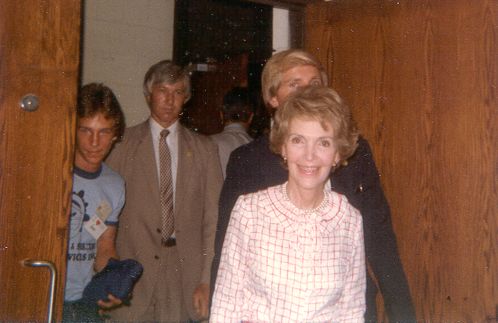Ronald Reagan won his first presidential victory despite the unrelenting hostility of the news media, which was much more of a monopoly that it is now, and despite his advanced age. He went on to won his second victory in a historic 49 state landslide, which seems inconceivable now. But Mr. Reagan was an unabashed Conservative, supposedly too Conservative to be elected. Yet Mr. Reagan commanded not only the Right, but the also won over the center of American political life.
How did Ronald Reagan do this? How did he win over so many voters?
Mr. Reagan was indeed the Great Communicator, a title he apparently bestowed upon himself. But the title has stuck because it fits. Mr. Reagan’s most reliable biographer, Lou Cannon, gets close to the explanation. Cannon said that Ronald Reagan “was a guy who had a natural connection with people.”
But that is a little bit misleading. Mr. Reagans did have a connection with people. And his apparent simplicity and humor made that connection seem natural. In fact, that effectiveness was no more “natural” than Arnold Palmer’s golf swing, or Chet Baker’s trumpet playing. There has to be talent at the outset for great success to be possible. But the appearance of effortlessness, of naturalness, is in fact the result of hard, focused, persistent effort.
Mr. Reagan was an ambitious man who succeeded in every field he entered. He was a successful lifeguard, athlete, sportscaster, movie actor, union president and politician. In each case he focused on mastering the necessary skills. While he is falsely remembered as lazy, in fact, across his entire professional life he was usually diligent and well-prepared.
The most important skill a politician has is motivating citizens to vote for him, and then to continue to support him after he has been elected. Mr. Reagan figured out how to do this, and mastered it. His “natural” connection to his fellow citizens, like all of his other successes, was also the result of diligence and preparation.
Our presidents have generally been either patricians, who were born to privilege and wealth, like FDR and JFK, or poor, self-made “kids from nowhere” — like Richard Nixon and the “man from Hope.” Reagan was in the latter category. And unlike many who later succeeded in life, Mr. Reagan never lost his awareness of the concerns and motivations of the less well-off Americans. His Hollywood career was during the age when the big studios carefully calibrated their movies to appeal to the mainstream ideas and values of Americans. His tours speaking on behalf of General Electric brought him into contact with American workers and managers around the country, and their hopes and worries. So, President Reagan started out with a firm basis for his “natural connection” to his fellow Americans.
But the most under-rated detail about Mr. Reagan is his treatment of his correspondence, his “mail bag”. Even after he was elected President, often to the despair of his aides, who thought he had “more important” things to, President Reagan spent several hours per week reading letters from ordinary Americans. Mr. Reagan would respond, in his own hand, to some of these letters. He never allowed himself to get too far from the thoughts and phrases of his fellow Americans. He disciplined himself to articulate responses to their concerns, in words they would grasp and respond to. This process, like batting practice, like the ballerina at the barre, was what made Mr. Reagan the Great Communicator.

